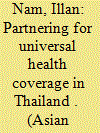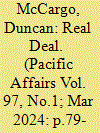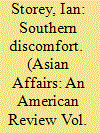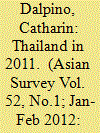| Srl | Item |
| 1 |
ID:
089926


|
|
|
|
|
| Publication |
2009.
|
| Summary/Abstract |
By examining different Thai regime forms over the last 30 years this paper attempts to show how an uneasy co-existence between liberal and authoritarian forces has impacted on the exercise of power and regime form. Arguing that the persistence of authoritarian power in the military and the monarchy is central to understanding the nature of Thailand's ambivalent state, it moves to a contemporary analysis of 'decisionist politics'.
|
|
|
|
|
|
|
|
|
|
|
|
|
|
|
|
| 2 |
ID:
179936


|
|
|
|
|
| Summary/Abstract |
Since the publication of my article “Network monarchy and crises of legitimacy in Thailand” (Pacific Review, 2005), network monarchy has become an influential concept in the analysis of Thailand’s politics. Though widely adopted, the argument has also spawned rival or complementary coinings, ranging from “autonomous political networks” (Harris) to “working towards the monarchy” (Uenaldi), and the “deep state” (Merieau); as well as the “parallel state” and the “monarchized military” (Chambers and Napisa). This article revisits the argument, elaborates on the meanings of the original term and makes a case for network monarchy’s continuing salience in the Tenth Reign.
|
|
|
|
|
|
|
|
|
|
|
|
|
|
|
|
| 3 |
ID:
160415


|
|
|
|
|
| Summary/Abstract |
The Thai National Health Security Act of 2002 established a universal health coverage program that extended health care to 18 million previously uninsured Thais and significantly reduced rates of medical impoverishment. This article highlights the key role that a coalition of health bureaucrats and NGOs played in achieving this outcome.
|
|
|
|
|
|
|
|
|
|
|
|
|
|
|
|
| 4 |
ID:
193641


|
|
|
|
|
| Summary/Abstract |
Thailand’s 2023 election outcome did not correspond with the results: the Move Forward Party “won” the polls, but runner-up Pheu Thai ended up forming the government. How could this have happened? This article offers two explanations. First, results and outcomes have typically differed in recent Thai elections: in itself, the substitution of Pheu Thai for Move Forward was nothing unusual. Second, in 2023 an elite pact was in place to ensure that Pheu Thai and the country’s conservative elite could engage in a form of promiscuous power-sharing following the May 14 polls. The article explains the politics behind this deal-making, and argues that the creation of the Srettha Thavisin government may not have been an accidental electoral outcome, but could have formed part of a deliberate strategy by the Thai establishment.
|
|
|
|
|
|
|
|
|
|
|
|
|
|
|
|
| 5 |
ID:
081711


|
|
|
|
|
| Publication |
2008.
|
| Summary/Abstract |
Separatist violence in Thailand's southern provinces has claimed the lives of more than 3,000 people since January 2004 and represents the kingdom's-arguably the region's-most serious security threat. The underlying causes of the violence stem from the Thai state's annexation of the Patani Kingdom in 1902 and subsequent efforts by Bangkok to coerce Malay Muslims into becoming Thai Muslims. Poor governance, maladministration, and political and economic marginalization have exacerbated feelings of resentment toward Bangkok. The proximate causes of the upsurge in violence in January 2004 include changes in the international environment post-September 11, 2001 and the political initiatives of former Prime Minister Thaksin Shinawatra. State responses under Thaksin were deeply flawed and served only to inflame separatist sentiment. After the September 19, 2006 coup, the new government adopted a more conciliatory approach, emphasizing national reconciliation and improved governance. The military regime was unable to stem the violence, however, as it failed to follow through on rhetoric and the government became preoccupied with national politics. Without a comprehensive political solution to the problem, one that includes genuine autonomy for the south, the violence looks set to continue.
|
|
|
|
|
|
|
|
|
|
|
|
|
|
|
|
| 6 |
ID:
103638


|
|
|
|
|
| Publication |
2011.
|
| Summary/Abstract |
In the first half of 2010, political tensions in Thailand rose steadily until they literally burst into flames as anti-government protesters set a commercial district on fire in response to the government's crackdown to reclaim the area. The country's other internal conflict, communal violence in the Muslim-majority provinces of the South, was all but ignored in the broader political emergency.
|
|
|
|
|
|
|
|
|
|
|
|
|
|
|
|
| 7 |
ID:
113921


|
|
|
|
|
| Publication |
2012.
|
| Summary/Abstract |
Although the pro-Thaksin Pheu Thai Party was favored to win Thailand's parliamentary elections in July, the party's 53% majority gave it a mandate that was stronger than expected. However, two months into her administration, the government of Prime Minister Yingluck Shinawatra was challenged by Thailand's worst floods in half a century. The crisis initially exacerbated the partisan political divide and gave a new twist to the urban-rural tensions that fueled Thailand's five-year political crisis.
|
|
|
|
|
|
|
|
|
|
|
|
|
|
|
|